The Essential Guide to Starting a Catering Business from Home

According to figures from the Nationwide Caterers Association, the number of street food vendors setting up each year has increased from ten to 1,000 in the space of five years, and that’s just a small area of the catering market. With this in mind, you need to give yourself not only the best chance of long-term success but during those first few months in particular, the best chance of survival.
For this reason, many catering businesses, especially those specialising in street food, have their beginnings in the kitchens of people’s homes. This is to keep overheads to a minimum until enough business and capital is acquired to move into a dedicated space, but there’s a lot you need to know first; if you want to lower the cost of starting up your business and are keen to get started as soon as possible, this guide to running a catering business from home is for you.
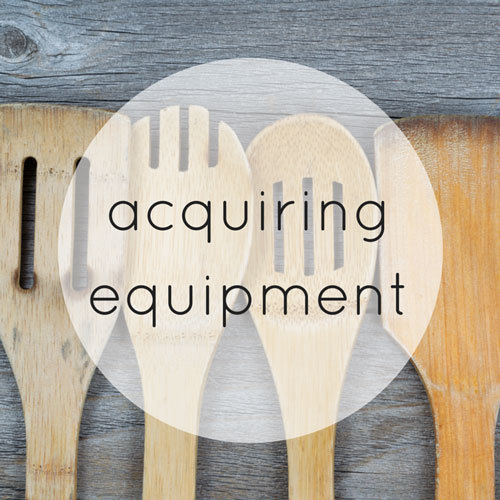
Setting up at home will save you rental costs, which makes it less likely you will overextend your spend in those crucial initial months but you’ll need to ensure your kitchen is well appointed. If you’re planning on catering for large groups you’ll not only have to consider whether you have the correct cooking equipment but also factor in storage too.
With this in mind, information in our fridge buying guide is likely to prove useful to you at this stage. As part of your initial premises inspection you’ll need to show you have utensils and equipment for the exclusive use of your business, so you might find you need specialist items along with the basics. Our 20% discount for all new Lockhart customers is sure to help you keep the costs down when setting your business up. Don’t forget to incorporate transport into your equipment buying budget; any vehicle you use to carry your food to your customers will need to be clean and in good repair. More importantly, food will need to be kept at the right temperature, which may mean you need to use cool boxes or even invest in a refrigerated van or trailer.
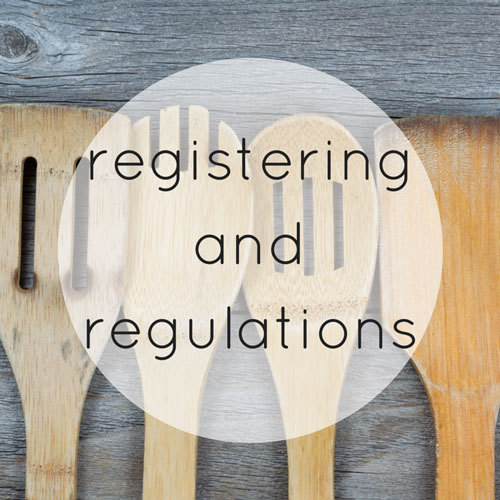
First things first, you’ll need to register with your local council at least 28 days before you start trading. Many first-time caterers choose to test the waters on a part-time basis before they quit their full-time jobs to commit to a catering career, and if you choose this pathway you should be aware that the rules of registration still apply. The maximum penalty for failing to register your home catering business is two years in prison, and the punishment could be far worse if through failure to meet other regulations, you make one of your customers ill.
Your premises will also need to be approved for suitability. This involves checking food health and safety regulations can be met easily – for example, by ensuring you have separate handwashing facilities, and that your gas and electrical equipment is certified. Inspectors will also assess how easily the area can be cleaned and maintained, and they will want to know that your surfaces and equipment are not only easy to clean and in good condition, but also allow you to work in a way that avoids potential cross-contamination.
As part of this you’ll need adequate space to store food for customers and food for you and your family separately and in a way that adheres to refrigeration rules. If your washing machine is currently situated in your kitchen you may have to move it – ideally it shouldn’t be close to a food storage area. Similarly, you won’t want rubbish or food waste to build up near the food preparation point.
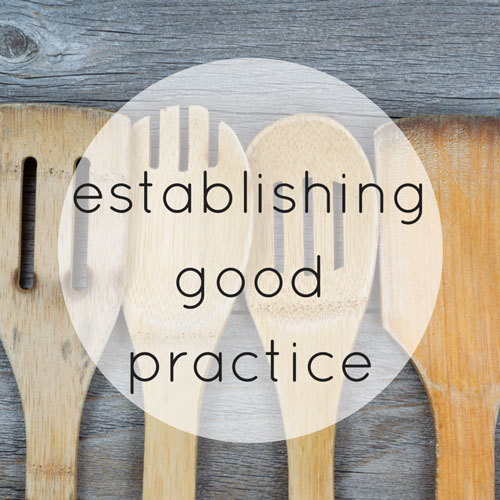
Even though you won’t have customers on the premises, you’ll still need to put in place a lot of the same routines and good practices that you’d find at an established café or restaurant when starting a catering business from home. Before you start you’ll need to have a Hazard Analysis and Critical Control Point system in place; this booklet from the Food Standards agency is invaluable for establishing essential food management procedures such as adhering to food storage regulations, keeping a record of suppliers and training any staff you may employ in how to handle food properly.
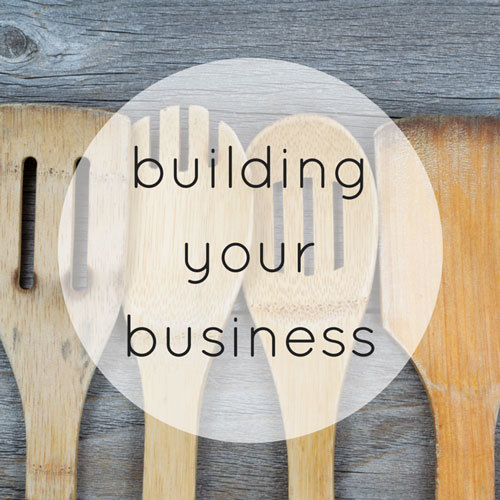
If you decide to initially build your business up alongside your ‘day job’, you may be able to better gauge what demand is like in your area and fine-tune your offering to suit.
However, working part-time hours may mean that you are unable to take on bigger jobs that would help you establish your reputation. Whichever path you choose, you need to be fully aware of your competition before you open for business, both in terms of the markets they cater to in your geographical area and how you compare in terms of price and quality.
If you were setting up a café or restaurant this research might involve visiting local establishments and checking out their menus, premises and price points. In the instance of setting up a business from home you’re more likely to head online and check out the search results for your local area.
If you have a niche for your business in mind, whether that’s specialising in a certain type of cuisine or targeting a particular type of customer, you should familiarise yourself with your competition and ask why a customer ought to choose your offering instead. While you don’t want to draw direct comparisons in your marketing you will want to make your USPs very clear to customers in any campaigns you carry out.

Very few businesses have much of a marketing budget in place when they first start out but that doesn’t mean you shouldn’t have a marketing strategy. Social media offers a fairly inexpensive way to connect with potential customers - you might look to build up engagement naturally or even invest in some targeted Facebook ads to reach more people.
A website is another essential way to bring customers to your business and enable them to find the information they need, and get in touch. However a professional looking website is likely to require some monetary investment and it’s important to keep in mind that without a bricks-and-mortar establishment for your business, your website acts as your ‘storefront’, so invest in the best you can afford!
As well as website and social media, might want to consider traditional marketing mediums that fit your respective niche. You might choose to deliver flyers to your target group, attend events such as wedding exhibitions, or perhaps even drop off tasters and cards to businesses, venues or street food events that you could potentially partner with.
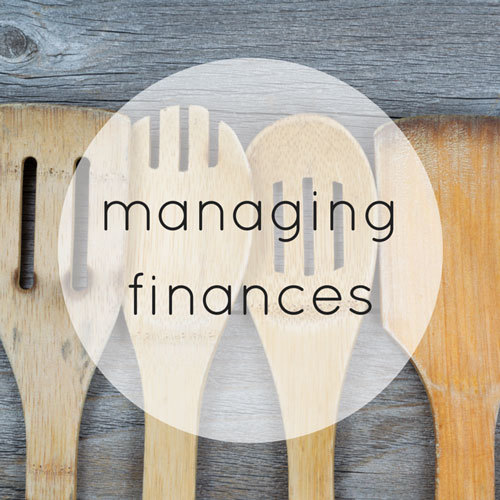
Unfortunately handling your finances is a fundamental part of setting up your own business. Making sure you have everything in order from the start will help you focus on your food offering and reduce stress levels at busy trading times.
You will need to start by registering with HMRC as a sole trader, partnership or limited company and working out what you can and can’t claim as expenses. Keeping proper records of your expenses is vital and if your income exceeds £79,000 you’ll need to keep VAT records too.
It’s not essential to hire an accountant but many businesses choose to do so, but no matter who submits the all-important tax return, good record keeping will go a long way towards making your self-assessment tax submission as hassle-free as possible.
If you intend to employ any staff you’ll have an extra layer of financial bureaucracy to consider – from pay and pensions, through to uniforms and training budgets, and not to mention compulsory employer liability insurance too. Public liability insurance is another essential financial product you will need to purchase and you may also consider investing in equipment insurance and business interruption insurance depending on the respective risks of your business operation.

If you’ve read all this and are still chomping at the bit to start feeding the masses, there is one last thing you should consider and that is the potential impact that running a home catering business may have on you and those around you.
Even if you plan to sell your food elsewhere, little things will need to change – children won’t be able to come and go from the kitchen, nor will pets. Your place of rest will soon be seen as your place of work, that’s not to say you won’t enjoy the work of course! Working for yourself can be incredibly rewarding and there’s nothing quite like the rush of getting an order out to a satisfied customer on budget and on time.
If you decide home catering is for you, put some plans firmly in place. Start with a timeline of how you will build your business and create a checklist to help you get everything in place. You may want to investigate using project management tools such as Todoist or Trello to help you do this. The Nationwide Caterers Association offer some great support and advice to food start-ups, so you might decide to become a member as part of your prep. And of course, Lockhart Catering is on hand for any equipment you might need, from buffet platters to pasta machines.
Is 2015 the year you’ll start your own home catering business or are you a firmly established caterer with some tips you’d be willing to pass on to those new to the industry? Please leave your words of wisdom in the comments section below, or tweet us at @BunzlLockhart."




Leave a comment